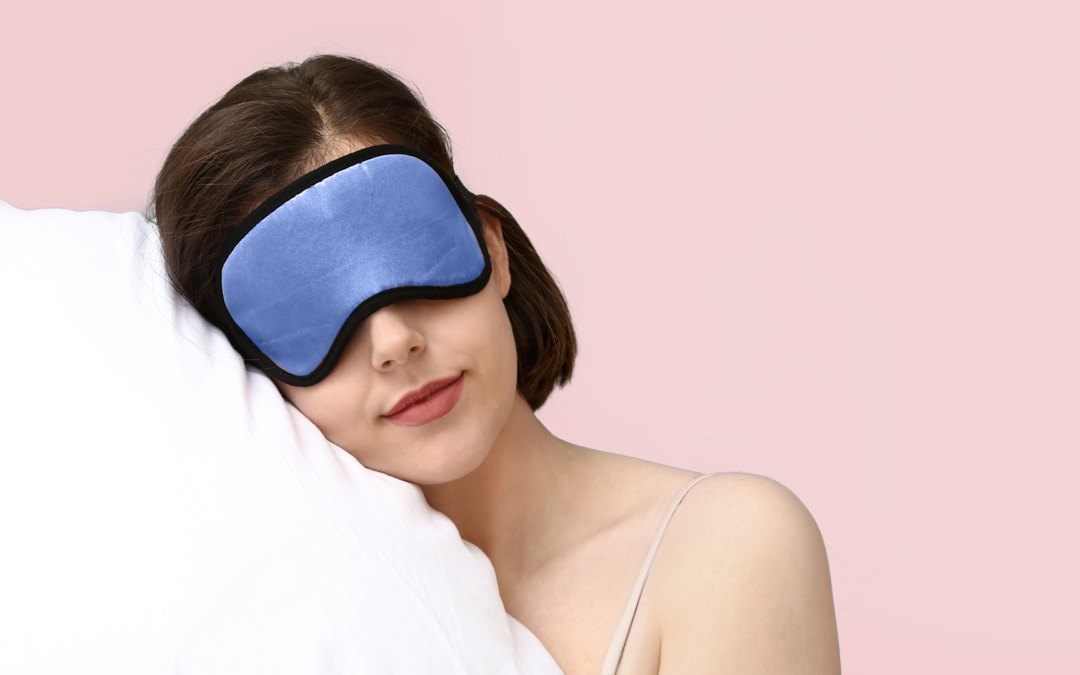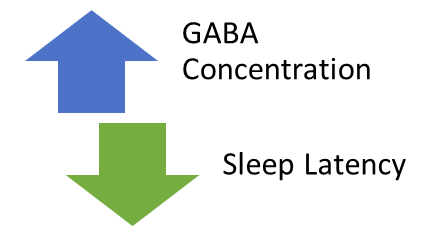Did you know that sleeping is a very complex physiological process?
Even just the simple act of falling asleep begins on the molecular level with a neurotransmitter, which is a chemical that acts on the neurons in the brain to communicate to the body that it’s time to go to sleep. Many of us have sleep troubles. Some of them may be due to low levels of inhibitory transmitters in the brain. GABA is one of the most essential neurotransmitters in the brain that is essential for a good night’s sleep.
In this article, we’ll be discussing how GABA is an essential sleep aid that helps both the body and mind relax and fall asleep.
But first:
What Is GABA?
GABA stands for Gamma-Aminobutyric Acid.
It is a neurotransmitter responsible for communication between neurons and the brain. Its primary function as an inhibitory neurotransmitter is to suppress the activity of neurons.
How does that work?
Other than glutamate, GABA receptors may be the most common type in the central nervous system, with estimates of close to 40% of the brain’s synapses having GABA receptors. When GABA binds to these receptors, the excitability of the neurons is reduced and their activity is suppressed, resulting in a sedative action that encourages sleep and exerts anti-anxiety effects.
The neurons will start to switch off the signals that tell your body that you’re awake in preparation for falling asleep. For that reason, GABA is one of the most important factors of a long, restful sleep.
In addition:
Extensive research has indicated that GABA significantly increases the calming alpha waves and decreases the arousing beta waves in the brain.
This helps ease the transition from wakefulness to sleep and reduces both physical and mental stress, decreases anxiety, and induces a feeling of calmness.
We’ll look at that in greater detail later.
Let’s examine:
What Happens When GABA Levels Are Too Low or High?
The dominant belief among researchers is that low GABA levels are associated with sleep troubles.
But why is that?
Low levels of GABA means that there is an insufficient level of inhibitory activity. Our busy minds need to be able to absorb and process the events of the day and settle into a state of rest. When GABA levels in the brain are low, then that leads to the brain’s hyperarousal and inability to fall and stay asleep. Many studies have shown significantly lower brain levels of GABA in patients with primary insomnia, otherwise known as insomnia.
However:
Individuals with high levels of GABA have also reported sleep problems. This may be due to the role that GABA plays as a stress regulator in the adrenal medulla, which is the inner part of the adrenal glands.
Well, how does that work?
The synthesis and secretion of GABA is done in response to a stressor.
GABA is secreted from adrenal chromaffin cells, which make neurohormones such as the adrenaline hormones epinephrine and norepinephrine. GABA then acts on those adrenal chromaffin cells or the nearby sympathetic neurons to regulate their release of catecholamine hormones dopamine, epinephrine, and norepinephrine.
So what happens if GABA levels are too high?
GABA inhibits the effects of other neurotransmitters.
As a result, high levels of GABA may appear to copy the effects of low levels of other neurotransmitters such as dopamine and norepinephrine. For that reason, you may not have enough brain activity and may lead to hypersomnia. The condition of hypersomnia may manifest as either excessive sleepiness during the daytime, or prolonged sleep during the nighttime.
There has been research done on the connection between excessively high GABA levels and sleep disturbances.
One study published in the Sleep journal in 2012 actually found that the average occipital GABA levels was 12% higher in individuals with insomnia than in individuals without sleep troubles. The researchers of this study believe that this occurrence is a response to chronic hyperarousal to restore allostasis.
Let us explain:
The functional changes in the body caused by insomnia point to a hyperarousal disorder in which you experience daytime fatigue and a reduced ability to go to sleep.
Allostasis refers to the body’s attempt to adapt to stressors by modifying all physiological parameters, such as blood pressure or hormone production, in order to restore stability. So, increased GABA levels in individuals with insomnia represents the body’s attempt to adapt to stress and restore stability.
This theory is further supported by the fact that as GABA levels increase, the wakefulness after sleep onset decreases, much the same as was found in other GABA and sleep studies.
For reference:
Wakefulness after sleep onset is defined as the amount you spend awake after having initially fallen asleep and before waking up for good.
So how does that relationship support that theory?
This negative relationship between wakefulness after sleep onset and GABA levels suggests that the potential allostatic response is adaptable. Additionally, the researchers believe that insomnia may be partially caused by a combination of inefficient GABA signaling with increases in cortical GABA levels to compensate.
Let’s get into:
GABA Benefits as a Sleep Aid
It’s time to dive more deeply into the previously discussed concepts of alpha and beta waves. Alpha waves represent non-arousal; their activity means that the brain has settled into a state of relaxation, but you are still awake and alert.
Alpha wave activity is present during times of daydreaming, or practicing meditation and mindfulness. It may also be produced when performing aerobic exercise. Beta waves represent arousal; their activity means that the brain is focused on problem solving, making decisions and judgments, and generally focused mental activity.
They are also linked to feelings of anxiety and unease. For that reason, high alpha wave activity and low beta wave activity have been utilized as indices of arousal, relaxation, anti-stress, and a greater ability to concentrate.
In one study that investigated the relaxation and immunity enhancement effects of GABA administration in humans, Japanese citizens were given 200 mL of distilled water only, 200 mL of distilled water with 100 mg of GABA produced by natural fermentation, and 200 mL of distilled water with 200 mg of L-theanine.
The researchers used an electroencephalogram, or EEG, to measure the subjects’ changes in their alpha waves and beta waves generation ratios before administration, at the time of administration, 30 minutes after, and 60 minutes after administration.
It was found that the administration of 100 mg of GABA led to a significant increase in alpha waves and a marked decrease in beta waves, compared to just drinking distilled water, or drinking water with L-theanine.
Additionally, the ratio values of alpha to beta waves, which measures the harmonious status of relaxation and anti-stress conditions, was measured as significantly high after GABA administration, compared to just drinking distilled water, or drinking water with L-theanine. The researchers of the study believe that this means that the high ratio value indicated arousal and extreme relaxation, otherwise known as relaxed concentration.
Overall, GABA supplementation proved to be effective in providing relaxing and anxiolytic effects within an hour.
There’s more.
Another study was conducted on the potential synergistic sleep enhancement effect of a mixture of L-theanine and GABA in ICR mice.
For reference:
ICR mice are a strain of albino mice originating in Switzerland that is a general purpose model used for studies in toxicity, pharmacology, drug efficacy, and immunology. The ICR mice in the study were made to sleep through administration of sodium pentobarbital 40 minutes after being orally administered GABA, L-theanine, or a mixture of both. Sleep latency and sleep duration were the primary parameters of sleep that were measured.
In mice, sleep latency is measured as the time from administration to the loss of their righting reflex, which is an automatic reaction to correct their body orientation when taken out of their normal upright position.
There was a negative correlation between sleep latency and GABA concentration.
There was a significant difference of a 16.2% decrease in sleep latency following the administration of 100 mg of GABA per kg of water compared to control. In mice, sleep duration was measured as the time from the loss of their righting reflex to its return.
There was a positive correlation between sleep duration and GABA administration – as GABA concentration increased, sleep duration increased.
There was a significant difference of more than a 50% increase in sleep duration following the administration of 100 mg of GABA per kg of water compared to control. This study also measured how the administration of GABA and/or L-theanine affected other parameters of sleep such as NREM sleep, REM sleep, and theta wave activity.
Single administration of GABA of 100 mg per kg of water significantly increased REM sleep time by 71.5% compared to the control group. There was also a significant increase in theta wave activity of approximately 20% after single GABA administration compared to the control group.
For those who don’t know:
Theta wave activity is linked to deep meditation and relaxation, vivid dreamlike imagery, and creativity. It follows alpha wave activity in the early stages of sleep. Not only does GABA help promote alpha and theta waves in NREM sleep, but it has also been demonstrated in this study to increase total REM sleep time.
But that’s not all!
Another study was designed to investigate whether the GABAergic mechanism possibly affected the protective effects of melatonin in mice whose behavior was changed, and oxidative damage was increased due to induced 72-hour sleep deprivation. This sleep deprivation was found to have caused significant anxiety-like behavior in the mice, as well as oxidative damage, weight loss, and impaired motor activity.
When treated with melatonin in the amounts of 5 mg per kg of water and 10 mg per kg of water, that group of mice showed significantly improved locomotor activity, weight loss, and an anti-anxiety effect, compared to the control group of sleep-deprived mice who did not receive any treatments.
The melatonin treatment also had significant biochemical effects, including restoring reduced levels of glutathione and catalase activity, and significantly decreased lipid peroxidation and nitrite level, compared to the sleep-deprived mice in the control group.
For reference:
Catalase is an antioxidant enzyme that helps protect the cells from oxidative damage by reactive oxygen species, such as hydrogen peroxide.
Lipid peroxidation is the oxidative degradation of lipids, resulting in cell damage.
Overall, the researchers concluded that the GABAergic mechanism was involved in the protective effects of melatonin against anxiety-like behavior induced by sleep-deprivation and the related oxidative damage.
Liposomal GABA Supplements
In the past few decades, Liposomal Technology has emerged as a potential delivery system for supplements. That is because of its ability to effectively transport nutrients into the body, and help prevent their premature breakdown by stomach acids.
Liposomal Technology provides several important benefits, including:
- Micro-sized encapsulation that protects against the harsh acidity of the gastrointestinal tract
- Increased delivery to cells, tissues, and organs
- Higher absorption rates and bioavailability than other standard oral supplements
- Noninvasive compared to intravenous supplementation
- Lower doses provide the same effects as high-dose standard oral supplements
- Helps put nutrients to use by the body faster
- Prevents gastrointestinal distress usually experienced with standard oral supplements
Clearly, Liposomal GABA supplements deserve serious consideration as a potential sleep aid.
Why You Should Take GABA Supplement?
GABA helps promote alpha and theta wave activity to help get the body into a state of deep relaxation and decreases beta wave activity, which is associated with feelings of anxiety and unease.
GABA also significantly decreases sleep latency and increases sleep duration, as well as increases time spent in REM sleep.
You should take the necessary steps to keep your levels of GABA within a normal range to optimize its potential benefits as a sleep aid.

